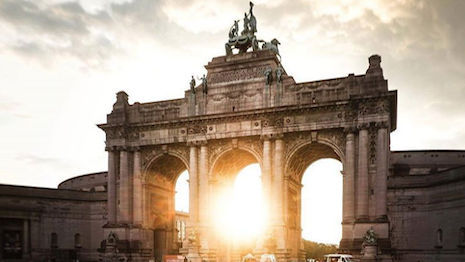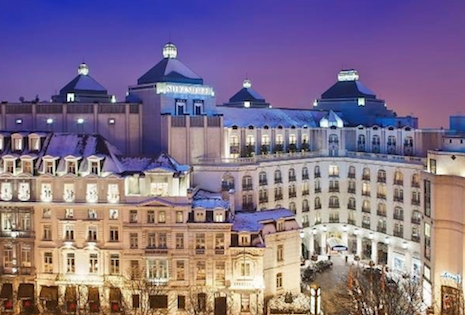 Brussels' Arcade du Cinquantenaire. Image credit: Visit Brussels, photo by @lorevinc
Brussels' Arcade du Cinquantenaire. Image credit: Visit Brussels, photo by @lorevinc
There is little doubt that these are unpredictable times for the world’s citizens, industries and the luxury goods and service sector, which is not completely shut out from global turmoil despite its status and positioning.
During the 16th edition of the International New York Times’ 2017 Luxury Conference, Vanessa Friedman, top editors from the news outlet and brand decision-makers will discuss matters of politics and economics. Topics during the 2-day conference range from Europe’s future, the politics of luxury, fake news, populism and pure marketing-based discussions such as communicating to the global consumer and generational behavior.
"I think any sector benefits from the experience of other sectors, that can be at a micro-level if you’re looking at the different areas of luxury, defined by consumers, or you can look more broadly," said Vanessa Friedman, fashion director and chief fashion critic, The New York Times, New York.
"Certainly technology develops strategy," she said. "Luxury has borrowed some technology strategy and technology has borrowed from luxury as an industry of consumer goods. The same is true of politicians.
"Disruptive thinking, risk-taking and creative approaches to problems, all those ways of approaching a business, are valuable no matter what your actual speciality is. That shared experience is how you learn and get ideas for your own company."
Not reactive, but active
Held Nov. 12-14 in Brussels at the Steigenberger Wiltcher’s Hotel, located on the Belgian capital’s high-street Avenue Louise, Ms. Friedman and her peers will lead discussions tackling different facets of these tumultuous times (see story), all through a luxury lens.
Brussels was selected as this year’s venue to establish a sense of place for the 2-day conference’s topics of discussion, as the city is considered the de facto capital of the European Union.
"The venue itself provides a kind of frame for the conservation and adds dimension to it," Ms. Friedman said. "For Brussels, which follows our conference in Washington, DC, we were really thinking about the strands of power, and how the poles are realigning and how that is affecting and shaping the luxury industry.
"That’s a large part of the substance of conversation," she said. "It made a lot of sense to be in a place like Brussels, which is the heart of the European Union and where Brexit is currently under debate, dealing with the terrorist threats, it’s really added depth to what we are going to talk about."
INYT's Luxury in a Turbulent World will be held Nov. 12-14 at Steigenberger Wiltcher’s Hotel
While luxury often feels as if it exists within a bubble, the political and economic stressors of today will transform how business is conducted regardless of sector and target consumer.
Transformational challenges are not the only factors that need to be considered. The rise of nationalism and the threat of terrorism must also be addressed (see story) along with technology’s rapid advancements. Technology is not only altering how consumers communicate, but also expectations and how purchases are made.
The International New York Times’ Luxury in a Turbulent World brings together thought leaders, influencers, policy makers, entrepreneurs and high-profile brands to explore how luxury can meet these challenges head on “in a world where the only constant is change and the biggest risk is taking no risk at all.”
Luxury in a Turbulent World kicks off Sunday Nov. 12 with a cocktail welcome reception.
On Monday, Nov. 13 sessions begin with Ms. Friedman’s opening remarks and a keynote presentation and interview on The Future of Europe led by New York Times’ Steven Erlanger.
Day 1 programming includes a panel discussion on the politics of luxury had between brand delegates from Belgium’s Delvaux, Chloé, Versace and Mr. Erlanger. The age of populism will also be a topic on Day 1 with a panel led by New York Times’ Elizabeth Paton with Saint Laurent and auctioneer Paddle8 delegates.
Additional sessions will touch on the new language of luxury, the future of flagship stores debate and how to best communicate across borders and generations.
Highlights on Day 1 include sessions with Calvin Klein’s CEO Steve Shiffman, a panel on the generational divide between Generations X, Y and Z as well as the rise of “reality culture.”
At the conclusion of Day 1, delegates and attendees are invited to attend a gala reception and dinner. The gala reception will be hosted at Le 27, the historic maison of Delvaux located on Boulevard de Waterloo.
After, guests will enjoy a gala at The Royal Museum of Fine Art where museum staff will guide attendees through a tour of Rene Magritte paintings or its collection of Old Masters. Dinner at the museum will follow.
Day 2’s program opens with a keynote discussing “The Next Big Conglomerate.” The session includes Reed Krakoff of Tiffany & Co. and Victor Luis of Tapestry, the rebranded Coach, Inc. (see story). The conversation will be led by Ms. Friedman.
The half-day of sessions continues with topics dedicated to “Where is the Money Going,” based on McKinsey & Company research, as well as talks on diversity and personalization.
The closing keynote on “Fake News and Transparency” will be led by LVMH-owned Berluti’s Antoine Arnault and Ms. Friedman.
Luxury in a Turbulent World concludes with a networking luncheon at Steigenberger Wiltcher’s.
A full list of speakers and expanded agenda can be found here.
Luxury Daily is a media sponsor of the International New York Times' Luxury in a Turbulent World conference.

